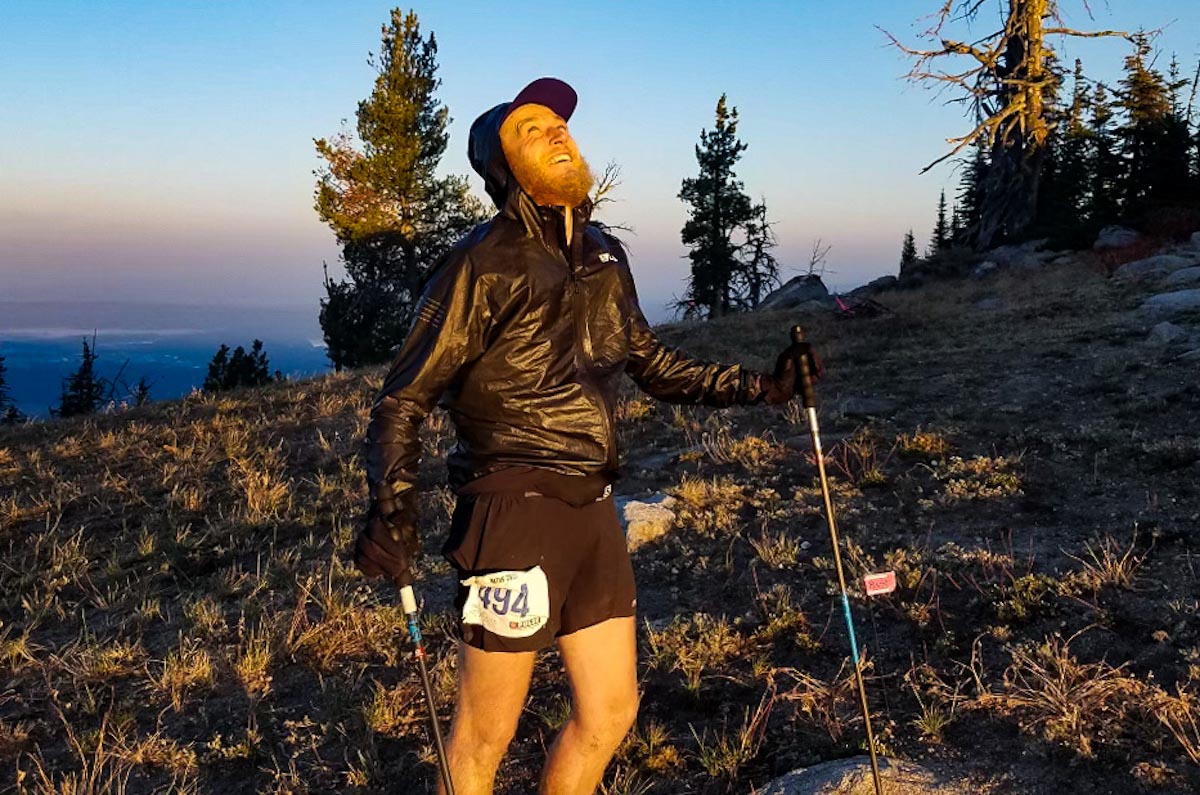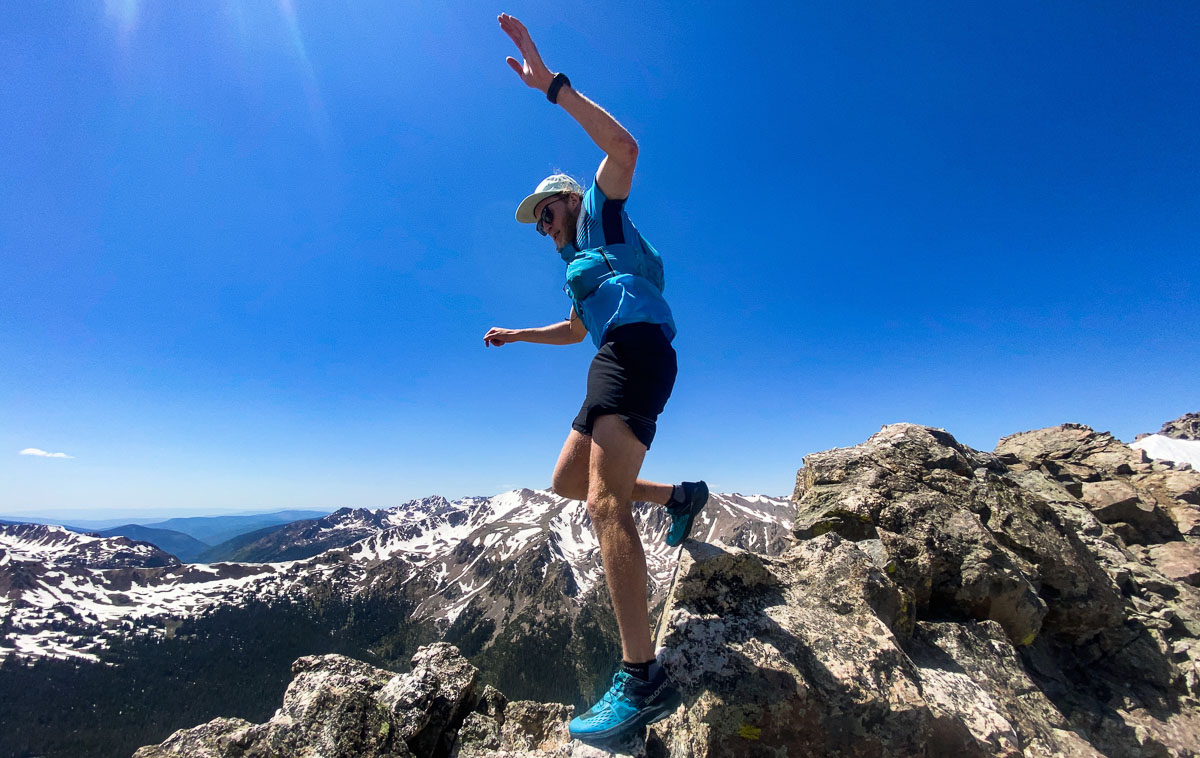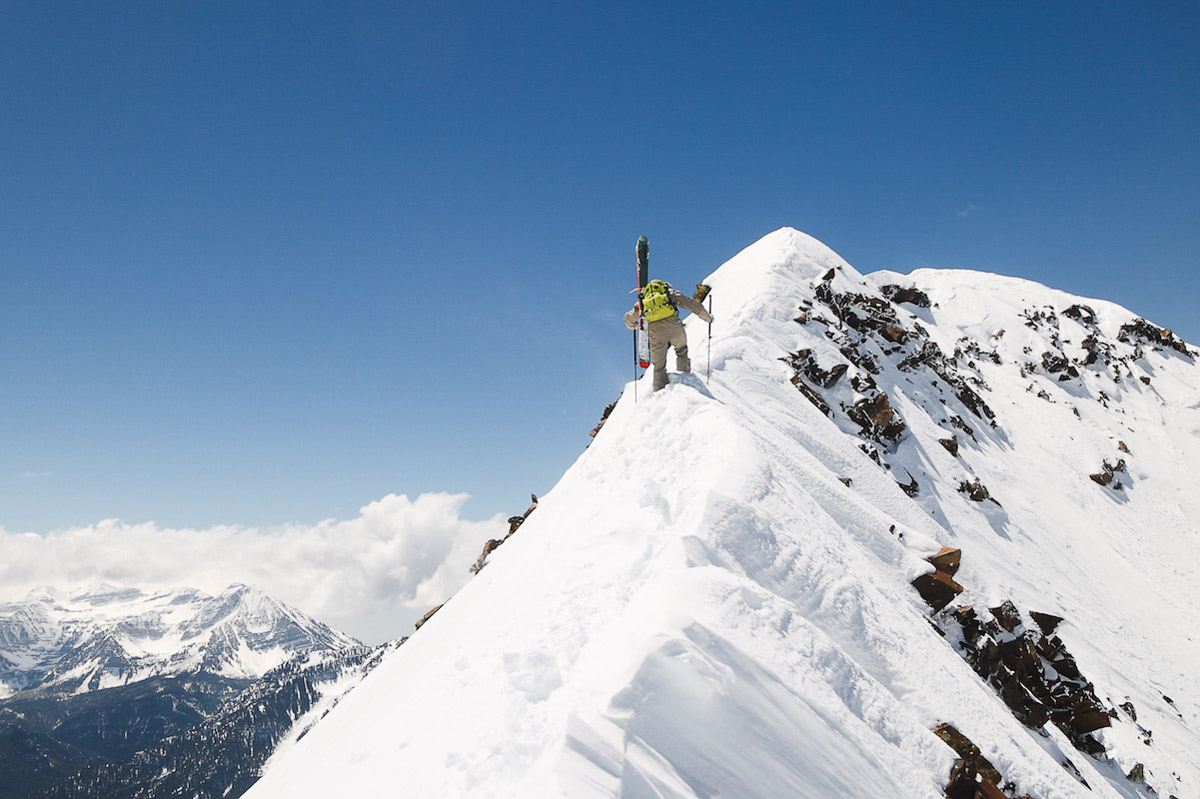[Editor’s Note: If you’re struggling with mental health or suicidal thoughts, help is available. Call 1-800-273-8255 to reach the National Suicide Prevention Lifeline 24 hours a day.]
Drew Petersen describes himself as a professional skier “with a running habit.” For years, no challenge seemed too big for him. He’s skied the highest peak in every state of the American West and ran the WURL solo in under 24 hours. In 2021, he completed his first 100-mile race, the IMTUF 100 Mile in Idaho. He has photographed, filmed, and written extensively about his adventures, all while skiing and running at a high level.
But an October 2017 ski mountaineering accident on Oregon’s Mount Hood brought Petersen a different kind of challenge altogether. During the outing, a microwave-sized rock detached from a 40-foot cliff and landed on his head, shoulders, and arm.
Astoundingly, Petersen was relatively uninjured; the rock hadn’t broken his back or neck, and he wasn’t paralyzed. In the wake of the accident, he started to recover physically. But emotional and psychological healing proved to be a different story.
“Ups and Downs:” Petersen Climbs Out
That’s the story Salomon’s short documentary Ups and Downs tells. Petersen has spent the years since the incident winding through a labyrinth of mental health crises. Post-traumatic stress disorder, brain injury rehabilitation, suicidal thoughts, and a type 2 bipolar disorder diagnosis have all wreaked havoc on his path to recovery.
The film is gripping — Petersen’s voice often quakes with emotion, but he faces the truth with transporting bravery.
Until recently, Petersen hid his struggle from the public eye. Consistent therapy and an insistence on writing about his reality eventually led him to an important realization.
“Asking for help is one of the strongest things you can do,” he says in the film. “It’s probably the most important thing I’ve done in my whole life.”
Petersen Speaks Up for Mental Health in the Mountains
During his ongoing recovery process, Petersen has strongly advocated for increasing support for mental health dialogues in mountain sports. Immediately following his accident, he sometimes analyzed it with the spartan tone of the traditional mountain athlete — terse, professional, and technical. Now, he knows that physical safety is only a piece of the puzzle.
Petersen has a unique experience with mental health trauma. He grew up in Silverthorne, Colorado. Though he grew up in a mountain playground, all of Colorado is also part of a region sometimes grimly called the “suicide belt.” Of the 10 U.S. states with the highest annual suicide rates, six fill the map from New Mexico to Montana.
Speaking to the issue, he said mental health resources have increased in recent years.
“Access to resources is improving, even though there’s a long way to go. There are a lot of great people and organizations. I think that it’s worth noting the availability of digital and online services has been critical for mountain towns and small communities,” he said.
Petersen also senses a shift concerning mental health in the outdoor sports world. He’s previously written about mountain athlete machismo in a way most of us can probably relate to.
Attention tends to gather around stoke and high performance: training, celebration, and partying are all hallmarks of the community, but space for vulnerability can be limited. However, a new dialogue surrounding the topic — even among those who would be “hard men” — does seem to be emerging.
Since Petersen’s accident, he’s noticed that the mental health space is beginning to change in the outdoor community.
“Ultimately, I made this film to help other people. If I could have heard my own story when I was living these struggles, it would have been instrumental in me getting help sooner, in healing, and in feeling less alone …
“It’s been awesome to see discussions surrounding mental health increase in recent years, but there have been holes within that. A lot of the dialogue doesn’t go very deep, like the darkness myself and others have experienced. My hope was that going to this level of depth could help a lot more people feel seen in their struggles.”
Petersen as a Runner, and Future Plans
This year, Petersen plans to run a 100 miler, and likely the Broken Arrow 52k. He first added ultrarunning to his repertoire in 2014, because of a bad ski accident that left him laid up for the better part of a year.
“My passion for trail running has really been reignited in recent years. In 2014, I had one of the worst ski crashes of my life in which I dislocated my hip, dislocated my shoulder, partially tore my ACL, fractured my sacrum, and broke a few ribs. I was laid up and rehabbing for over a year.
“That summer, I spent a lot of time in between surgeries looking out at the mountains and dreaming up different ways to connect peaks and run traverses along the ridgelines … It took a few years since then and I weathered a lot more injuries from skiing before I was able to make trail running as big a part of my life as it is now.”
Along with continuing his mountain sports career, Petersen is focused on doing his part to keep the mental health conversation open among athletes.
“The running community in a lot of ways has been more open, more vulnerable, and has led the discussion on mental health in sport. Two of my biggest inspirations and people who made me feel less alone are Rob Krar and Alexi Pappas.
“On the flip side, the ski world isn’t nearly as far along in this discussion, in my opinion. So in a way, this has been an opportunity for me to pay forward some of the inspiration and camaraderie I’ve found in the running community to the ski community.”
“If you’re struggling … that means you’re human. Being human means you’re worthy of help. That’s it — that’s all you need to be worthy, is being human. These struggles are so much more common than we realize … Therapy can be helpful for everyone — ranging from folks like me with severe mental illness or who struggle with suicidal thoughts all the way to someone who is just interested in learning to live their life in a little better way,” said Petersen.
Learn more about Drew Petersen’s mental health journey in the film “Ups and Downs.”



